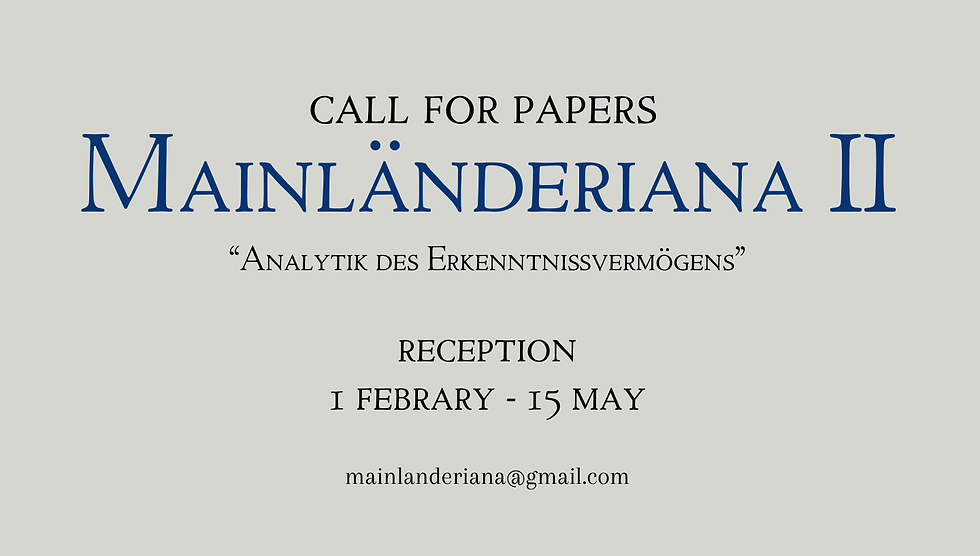CALL OF PAPERS FOR THE FIRST ISSUE
- cuadernosdepesimis
- May 24, 2021
- 3 min read
Updated: May 27, 2021
This section details the requirements for submitting articles for the first issue.

Pessimism and philosophy - first issue
The totality of that posterity is as absurd as contemporaneity. I know that this mob that occupies chairs and runs literary magazines will not stop barking at me.
Arthur Schopenhauer
Two years after the publication in 1710 of Wilhelm Leibniz's Theodicy Georg Christian Knoerr, under the supervision of Johann Franz Buddeus, wrote an extensive critique of this philosophy of the optimum under the title Doctrinae orthodoxae de origine mali contra recentiorum quorundam hypotheses modesta assertio. Already by 1737 the term "optimism" appears coined in the Jesuit periodical Memoires de Trevoux, as well associated with the best of all possible worlds of Leibniz's philosophy. From then on, optimism would occupy a prominent place in the attention of philosophers. 1755 would be a decisive year because many reactions to this thought start to occur, especially because of two events: the Lisbon earthquake and the competition of the Prussian Academy of Sciences under the presidency of Pierre Louis de Maupertuis, in which, concealing Leibniz with Pope, the participants were called to fight against the philosophy of the best of all possible worlds. Between 1733 and 1734, Alexander Pope had written b An Essay on Man according to which man, not being able to know God's purposes, must accept that "Whatever IS, is RIGHT". With this poem he popularized optimism not only in England but also in the rest of Europe, to such an extent that Voltaire, Rousseau and Kant, for example, expressed their admiration for it. The prize was awarded to Adolf Friedrich Reinhard for his essay entitled Le système de Mr Pope sur la perfection du monde, comparé à celui de Mr de Leibnitz, avec un examen de l'optimisme. Moses Mendelssohn and Gotthold Ephraim Lessing reacted to the latter, that is, the competition of the Academy, in the same year with their anonymous Pope ein Metaphysiker! And also that same year Voltaire wrote his Poème sur le désastre de Lisbonne ou examen de cet axiome: tout est bien and four years later his Candide, ou l'Optimisme in which he would satirize Leibniz and his philosophy. Also in 1759 Immanuel Kant published his Versuch einiger Betrachtungen über den Optimismus.
Already in the 18th century there were some reactions against optimism (Coleridge, Voltaire, Lichtenberg), but it is in the 19th century that we find in the thought of Arthur Schopenhauer a philosophically forceful response to optimism and we see, therefore, his Wisdom of the World (Weltweisheit) as the point where pessimism originates, being since then determinant of contemporary thought. In 1883 Guy de Maupassant, "after comparing the childish sarcasm, the religious sarcasm of Voltaire with the irresistible irony of Schopenhauer, whose influence is indelible", wrote in Auprès d’un mort: "even if many protest, get angry, indignant or exalted, there is no doubt that Schopenhauer has marked humanity with the stamp of his disdain and disenchantment. [...] he accomplished the most gigantic work of skepticism that could be attempted. [...And] even today, those who abhor him undoubtedly carry in their ideas, very much to their regret, reflections of his thought". Dorguth, Lebrecht Pomtow, Asher, Cornill, Bähr, Seydel, Frauenstädt, Kierkegaard, Bahnsen, Mainländer, von Hartmann, Nietzsche, Plumächer, von Druskowitz, Michaelstädter, Weiniger, Deussen, Spengler, Heidegger, Benjamin, Horkheimer, Adorno, Marcuse, Caraco, Cioran, Hortsmann are just a few of the names among many that since then have not ceased to emerge linked to the Schopenhauer Schools, that is, to the Schools of pessimism that find in Schopenhauer's thought their philosophical opportunity.
In this first issue of the Cuadernos de pesimismo we ask ourselves about the meaning of pessimism in relation to philosophy and whether it is possible to speak properly of a pessimistic philosophy or at least of philosophical pessimism.
Jesús Carlos Hernández Moreno






Comments